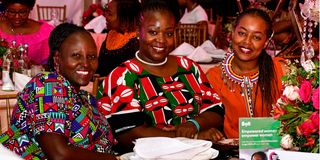Premium
30 years after Beijing, fight for women not over

Some of the guests who attended International Women's Day celebration hosted by Nation Media Group on March 8, 2024 at the Windsor Golf and Country Club, in Nairobi.
International Women’s Day marked on March 8 is more than just a date on the calendar, it is a moment of reflection, a call to action, and a reminder of the promises made to women and girls worldwide.
This year is particularly significant as it marks 30 years since the adoption of the Beijing Declaration and Platform for Action, one of the most ambitious global frameworks for achieving gender equality.
As nations gather at the 69th session before the Commission on the Status of Women in New York to assess their progress, we must ask ourselves, have we truly honoured the commitments made three decades ago?
Over the past 30 years, some progress has been made in advancing women's rights, including the enactment of progressive laws and policies. Instruments like the Maputo Protocol, which remains the most comprehensive legal framework for African women’s rights, and the recently passed African Union Convention on Ending Violence Against Women and Girls, highlight the continent’s commitment to gender equality. Yet, the persistent challenge remains implementation. The gap between policy and practice continues to hinder real change for millions of women across the globe.
One of the 12 critical areas of concern outlined in the Beijing Declaration is health, a sector that remains deeply troubled in Kenya. Article 43(1) of the Constitution guarantees every person the right to the highest attainable standard of health, yet recent developments indicate a distressing decline in the sector. The Auditor General’s revelations regarding the Social Health Authority (SHA) expose systemic failures, while the withdrawal of USAid funding for programmes including HIV/Aids, further threatens access to essential healthcare services. Even more concerning, a recent audit at Nakuru Level Five Hospital revealed Sh2 million worth of expired drugs, an indictment of the inefficiencies plaguing the health system.
Adding to these challenges are international policies that directly limit access to healthcare services for women and girls. The reinstatement and expansion of the Global Gag Rule under various US administrations have severely restricted funding for organisations providing comprehensive reproductive healthcare. Similarly, the Geneva Consensus Declaration, signed by a coalition of conservative governments, undermines reproductive rights by reinforcing anti-abortion policies on a global scale.
Women’s health is not just about medical care; it is about their ability to live with dignity, to make informed choices, and to thrive. As we commemorate International Women’s Day, we must move beyond mere celebration and engage in deep reflection. Thirty years after Beijing, the fight for gender equality, particularly in healthcare, remains unfinished. Urgent interventions are needed to safeguard women’s rights and access to healthcare. Let this be a year of renewed action, where we hold governments accountable and push for real, tangible change. The time for empty promises is long past; women and girls deserve better.
Mr Mutua is a human rights practitioner and Advocate of the High Court of Kenya. [email protected]


